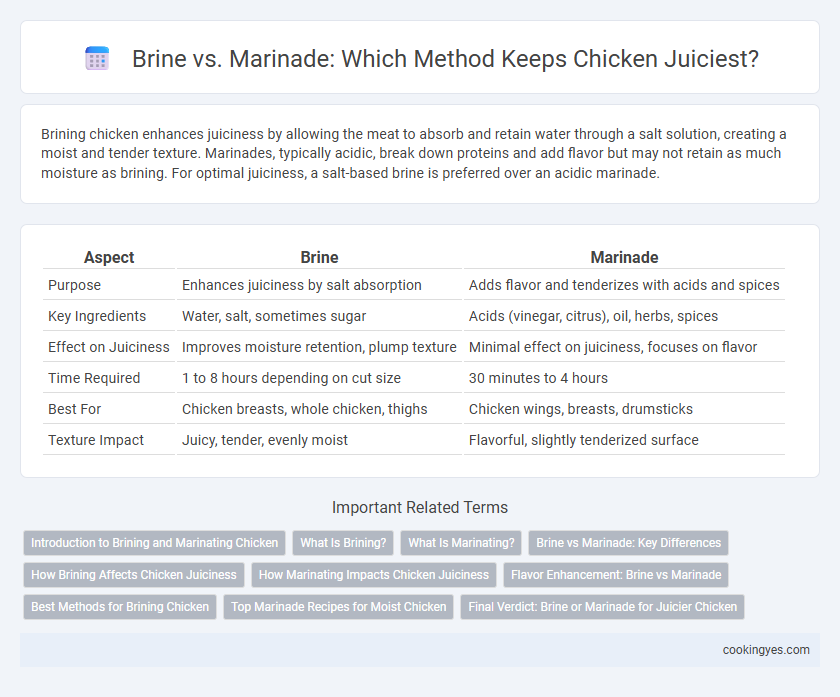Brining chicken enhances juiciness by allowing the meat to absorb and retain water through a salt solution, creating a moist and tender texture. Marinades, typically acidic, break down proteins and add flavor but may not retain as much moisture as brining. For optimal juiciness, a salt-based brine is preferred over an acidic marinade.
Table of Comparison
| Aspect | Brine | Marinade |
|---|---|---|
| Purpose | Enhances juiciness by salt absorption | Adds flavor and tenderizes with acids and spices |
| Key Ingredients | Water, salt, sometimes sugar | Acids (vinegar, citrus), oil, herbs, spices |
| Effect on Juiciness | Improves moisture retention, plump texture | Minimal effect on juiciness, focuses on flavor |
| Time Required | 1 to 8 hours depending on cut size | 30 minutes to 4 hours |
| Best For | Chicken breasts, whole chicken, thighs | Chicken wings, breasts, drumsticks |
| Texture Impact | Juicy, tender, evenly moist | Flavorful, slightly tenderized surface |
Introduction to Brining and Marinating Chicken
Brining chicken involves soaking it in a saltwater solution that enhances moisture retention and tenderness by allowing muscle fibers to absorb and hold water during cooking. Marinating chicken uses acidic or enzymatic ingredients like lemon juice, vinegar, or yogurt to break down proteins, infusing flavor and contributing to juiciness. Brining primarily improves moisture content, while marinating combines flavor infusion with varying degrees of tenderness enhancement depending on the marinade composition.
What Is Brining?
Brining involves soaking chicken in a solution of water, salt, and sometimes sugar to enhance moisture retention and flavor. The salt in the brine breaks down muscle proteins, allowing the meat to absorb and retain more water during cooking, resulting in a juicier texture. This process is especially effective for lean cuts like chicken breast, preventing dryness and improving overall tenderness.
What Is Marinating?
Marinating involves soaking chicken in a seasoned liquid mixture, typically containing acids like vinegar or citrus juice, oils, and herbs, to infuse flavor and tenderize the meat. The acidic components break down protein structures, enhancing moisture retention and resulting in juicier chicken after cooking. Unlike brining, which relies on salt to draw moisture into the meat, marinating penetrates the surface for both flavor and texture improvement.
Brine vs Marinade: Key Differences
Brining chicken involves soaking it in a saltwater solution that enhances moisture retention by altering protein structure, resulting in juicier meat after cooking. Marinades typically combine acidic ingredients like vinegar or citrus with herbs and spices, which tenderize the chicken's surface and infuse flavor but do not penetrate as deeply as brines. The primary difference lies in brine's ability to increase internal moisture and tenderness, while marinades mainly improve surface flavor and texture.
How Brining Affects Chicken Juiciness
Brining chicken increases its juiciness by allowing the meat to absorb and retain extra moisture through osmosis, resulting in a tender and succulent texture after cooking. The salt in the brine denatures proteins in the chicken, which helps to retain water within the muscle fibers. This process prevents dryness and ensures a moist, flavorful bite, outperforming traditional marinades in preserving chicken juiciness.
How Marinating Impacts Chicken Juiciness
Marinating chicken enhances juiciness by allowing acidic ingredients, oils, and seasonings to penetrate the meat, breaking down proteins and increasing moisture retention during cooking. Unlike brining, which relies on salt to draw and hold water within the muscle fibers, marinades often incorporate flavor compounds that not only tenderize but also create a more complex taste profile. Effective marinating times range from 30 minutes to several hours, depending on the acidity level, ensuring the chicken remains moist and flavorful after cooking.
Flavor Enhancement: Brine vs Marinade
Brining chicken involves soaking it in a saltwater solution that boosts moisture retention and yields a tender, juicy texture by breaking down muscle proteins. Marinades combine acidic ingredients like vinegar or citrus with herbs and spices to infuse the chicken with complex flavors, enhancing taste more than juiciness. While brine primarily enhances moisture and subtle seasoning, marinades deliver robust flavor profiles but may slightly alter texture depending on acidity and duration.
Best Methods for Brining Chicken
Brining chicken in a solution of water, salt, and sometimes sugar enhances juiciness by increasing the meat's water retention through osmosis. The optimal brine solution typically contains 5-8% salt by weight, with a brining time of 1 to 4 hours depending on the cut and size to prevent over-salting. Using cold water and keeping the chicken refrigerated during brining ensures safety and maximum moisture absorption, resulting in tender and flavorful chicken.
Top Marinade Recipes for Moist Chicken
Top marinade recipes for moist chicken often combine acid, oil, and seasonings to enhance flavor and tenderness. Ingredients like lemon juice, yogurt, soy sauce, and garlic promote juiciness while infusing rich taste. Brining primarily boosts moisture retention through salt absorption, but marinades add complex flavors alongside moisture enhancement.
Final Verdict: Brine or Marinade for Juicier Chicken
Brining chicken enhances juiciness by allowing the meat to absorb water and retain moisture during cooking, resulting in tender and succulent bites. Marinades infuse flavor into the surface but do not penetrate as deeply, making them more suitable for taste enhancement rather than moisture retention. For the juiciest chicken, brining is the superior method because it improves moisture content and texture from within the meat itself.
Brine vs Marinade for chicken juiciness Infographic

 cookingyes.com
cookingyes.com